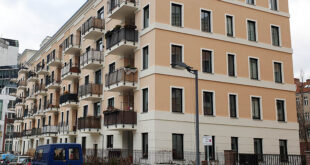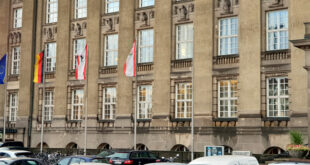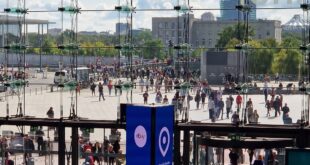Did you know that ‘Africa’ is a tiny hamlet in Brandenburg? Or that there are 11 ‘Cameroons’ in Germany? Places bearing African names in Germany have a varied history, writes Gwendolin Hilse.
Africa is a continent? Of course. In German, it’s spelt “Afrika” and that is also the name of a hamlet in the Uckermark district of the state of Brandenburg in eastern Germany. It consists of a sandy lane, four farm houses and a small stream. “What’s special about our “Afrika” is that you can drive here and have a look,” said local mayor Kai Herrmann. He is actually the mayor of the municipality of Flieth-Stegelitz to which “Afrika” belongs. So he is mayor of “Afrika” as well. “There is only one mayor of “Afrika” as far I’m aware,” he said.
But how did this tiny place come to be called “Afrika”? At the end of the Second World War, Germany’s frontiers were redrawn by the victorious powers. Germans who lived in the former eastern territories were expelled and there was a huge westward migration of refugees, some of whom landed in Stegelitz. Because of the post-war shortage of conventional building materials, they erected their own dwellings out of wood. “They’re living as if they are in Africa,” local Stegelitz residents said at the time. The name stuck. So far it hasn’t been exploited for tourism, but village signs bearing the word “Afrika” are stolen by souvenir hunters at regular intervals. “We have yet to find a way of putting a stop to the theft,” Herrmann said.
African names are not uncommon in remote parts of Germany. Kirstin Casemir researches German place names at the University of Göttingen. She says it is usually hamlets or isolated farms that are given African names. “In the 19th century, they were the homes of people who originally wanted to emigrate – for example, to the German colony of Cameroon (Kamerun). But because they never made it, the neighbours poked fun at them. ‘Look, he didn’t even make it to “Kamerun”, but is stranded here in Schleswig Holstein in the middle of nowhere.’ But the name “Kamerun” (German for “Cameroon”) stuck. There are many settlements named after such abandoned African destinations along the German coast. Giving a place an African name also served to underline how remote it was. But places bearing African names in what is now North Rhine Westphalia owe their origins to racist sentiments in the early days of industrialization. Railway workers, miners and others were frequently covered in soot and were therefore “black as in Cameroon”
Multiple Cameroons
There are eleven “Kameruns” in Germany and this can be a source of frustration to the local postal service. A few years ago, a parcel sent from Saxony to Lüneburger Heide in Lower Saxony took nine months to arrive. It had taken a rather circuitous route traveling 5,000 kilometers (3,000 miles) to Central Africa and back. A vigilant post office worker in Cameroon had sent it back to Germany. It was addressed simply to “Göhrde, Kamerun.”
“Kamerun” (German for “Cameroon”) was a German colony from 1884 to 1916. Its territory included today’s Republic of Cameroon as well as parts of neighboring African states. Unsurprisingly, “Kamerun” was a familiar name to people living in 19th century Germany.
“Forsthaus Kamerun” owes its name to the Wagners, one of Germany’s famous musical dynasties. In the early years of the Bayreuth Festival, which first began in 1876, the fiancé of Cosima Wagner’s eldest daughter undertook an excursion to the surrounding countryside (Cosima Wagner was composer Richard Wagner’s second wife).
Feeling hungry, he and a friend were given a meal by a hospitable forester’s wife. Charmed by the forester’s lodge and its idyllic surroundings, he trumpeted news of his discovery far and wide. “Like a Nachtigal (nightingale) in Africa,” he said. At that time, the papers were full of how the German flag was being hoisted in “Kamerun.” Gustav Nachtigal was then one of the driving forces between the establishment of German colonial rule there. The forester’s lodge in Bayreuth became known as “Neu-Kamerun” (New German Cameroon).
Today Forsthaus Kamerun houses an Italian restaurant. But a Cameroonian student came by recently and was amused to see this African foothold in a place so German as Bayreuth.
Deutsche Welle
 THE AFRICAN COURIER. Reporting Africa and its Diaspora! The African Courier is an international magazine published in Germany to report on Africa and the Diaspora African experience. The first issue of the bimonthly magazine appeared on the newsstands on 15 February 1998. The African Courier is a communication forum for European-African political, economic and cultural exchanges, and a voice for Africa in Europe.
THE AFRICAN COURIER. Reporting Africa and its Diaspora! The African Courier is an international magazine published in Germany to report on Africa and the Diaspora African experience. The first issue of the bimonthly magazine appeared on the newsstands on 15 February 1998. The African Courier is a communication forum for European-African political, economic and cultural exchanges, and a voice for Africa in Europe.



































